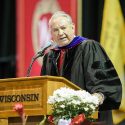Political scientists offer post-election perspectives
University of Wisconsin–Madison political science professors Katherine Cramer Walsh and Barry Burden provided their perspectives on the historic nature of Tuesday’s presidential election and the massive turnout of voters across the nation.
Cramer Walsh says Wisconsinites who voted for the first time on Tuesday generally had a positive experience at the polls. She says the state should be proud of the job that its poll workers performed.
“Because of same-day registration, we routinely have some of the highest turnout rates in the country,” says Cramer Walsh. “With yesterday’s historic national turnout, and the large number of new registrants, poll workers had quite a challenge.
“Our election laws are very trusting of the citizen,” she adds, “and as of early this morning, it appears that trust remains justified.”
She says that locally, poll workers staffing precincts with large numbers of UW–Madison students appeared to have responded to a large early morning rush with some changes in the waiting line set-ups that were effective in reducing the wait time.
Cramer Walsh says that if turnout among 18-29 year olds proves to be larger than in 2004, that would be a significant development.
“Turnout among this age group is consistently lower than for other age groups and lower in recent history than among previous generations. However, since 2000, we’ve seen a pretty consistent increase in turnout in this age group in mid-term as well as presidential elections. Another increase in 2008 could be convincing evidence that those increases weren’t just an artifact, but are instead a sign of increasing interest in politics among younger folks.”
What’s ahead for Wisconsin state government?
“With the new Democratic majority in both houses of state government, there are several pieces of legislation we can expect to see in front of the Legislature — a statewide smoking ban and a statewide, state-sponsored health care plan. The economy and health care have consistently been top priorities for the people of the state and the legislative agenda will most likely reflect that in the next session.”
On the historic nature of Barack Obama as president-elect:
“It goes without saying that it is truly remarkable that the United States will have its first African-American president as of January 20, 2009. What this means for race relations remains to be seen. The vast majority of people who voted didn’t vote because of race — the big issue motivating voters in this election was the economy.
“Nevertheless,” she adds, “Obama’s presidency is likely to have a huge impact on the role of race in politics. In particular, it is likely to have a very positive influence on young black Americans and their attitudes about politics. We know that in states where women have held or run for statewide elected office, girls are more interested in politics. The same is likely to be true for race: living in a time in which it is clear that an African-American can hold the most powerful office on the planet is likely to empower African-Americans and perhaps other people of color, especially those just coming of age.”
Professor Burden notes that on Election Day, voters elected only the third sitting senator in U.S. history and the first African-American as president, and it saw the highest voter turnout in perhaps a century. Burden says the election was also a repudiation of the Bush administration.
“Obama won in large part because of extreme dissatisfaction with Bush’s handling of the economy, the war in Iraq, and other issues,” he says. “Because the election was not driven by hot-button cultural issues such as abortion, it altered the familiar red-blue map in significant ways.”
The 2008 election also ends the period of 50-50 politics in America. The last two presidential elections have been razor thin, as have been the margins in Congress. Democrats won solid victories this time around, the biggest since the Clinton victories of the 1990s.
Burden says turnout among young people and African-Americans was up, and that helped Obama. But his victory was also due to other elements of the electorate, especially college-educated whites, Catholics, new voters, and urban voters.
“It is remarkable how Wisconsin has quickly transformed from a battleground state to a blue state,” says Burden. In the 2004 presidential election, Wisconsin was the closest of all the states, but it went to Obama by 13 points in 2008. The state also has a Democratic governor, two Democratic senators, and a newly-Democratic state legislature. This is part of a larger trend that has been sweeping across the Midwest.”

